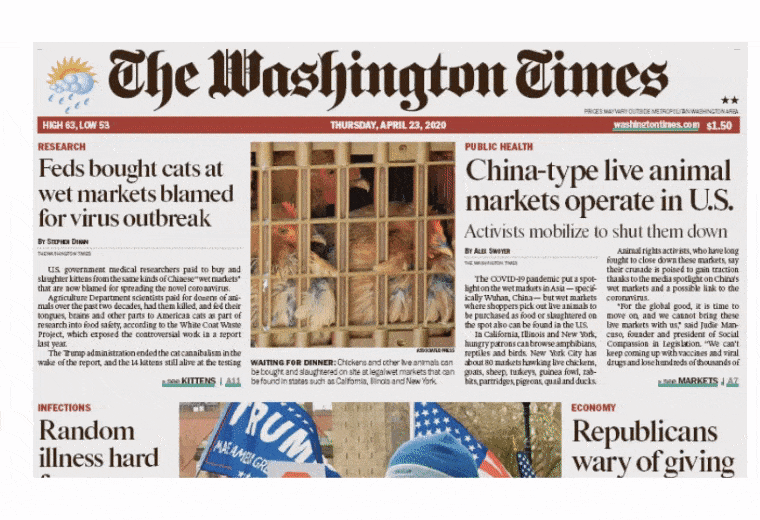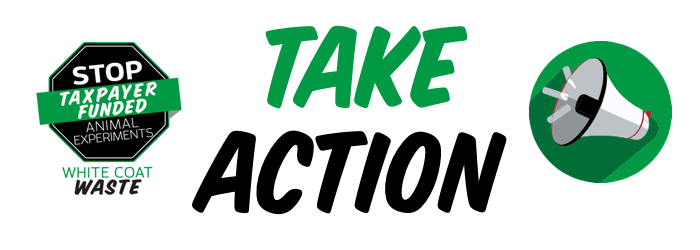Bipartisan Bill Will Stop Gov’t From Spending Your $ At China’s Wet Markets

You asked, they listened! As first reported by The Washington Times, NBC News and others, Senators Joni Ernst (R-IA), Jeff Merkley (D-OR), Mike Braun (R-IN), and Joe Manchin (D-WV) will be introducing a bill to prevent the U.S. government from wasting any more of your tax dollars at China’s disease-ridden wet markets that are linked to outbreaks like SARS.
Our American tax dollars were being spent at China’s ‘wet markets?’ Yup – you heard that right. And here’s what I’m doing to put an end to it: https://t.co/7SqDZhZKbw
— Joni Ernst (@SenJoniErnst) April 22, 2020
A bipartisan group of senators is proposing a bill to ban the U.S. from buying animals from the Chinese “wet markets” that have been blamed for outbreaks including the current coronavirus crisis. @SenJoniErnst https://t.co/c4uKJcChh0
— Senator Mike Braun (@SenatorBraun) April 23, 2020
This good and unfortunately necessary bi-pawtisan (sorry) legislation comes in response to White Coat Waste Project’s investigation of the U.S. Department of Agriculture’s (USDA) kitten slaughterhouse. We exposed how for years federal employees went on taxpayer-funded shopping sprees at Chinese wet markets to buy cats and puppies. They then had them slaughtered, and brought their body parts back to the United States—in carry-on luggage—to feed to kittens in bizarre and wasteful multi-million-dollar experiments.
Agriculture Department scientists paid for dozens of animals from Chinese wet markets over the past two decades according to the White Coat Waste Project, which exposed the controversial work in a report last year. #TWTFrontPagehttps://t.co/ybVqfbu4WC
— The Washington Times (@WashTimes) April 23, 2020
Read here about how we got this sick waste of taxpayer dollars shut down last year.
A bipartisan group of senators is proposing a bill to ban the US from buying animals from the Chinese wet markets that have been blamed for outbreaks including the current coronavirus crisis. https://t.co/TKw4NHYjV9
— NBC News (@NBCNews) April 22, 2020
This kind of reckless taxpayer-funded research involving disgusting wet markets—which are even known to sell experimental lab animals for consumption—puts animal, human, and global health in grave danger and has to be prevented in the future. This bill will ensure that no government bureaucrat spends another red cent at these, as Sen. Ernst—-a 2019 WCW Waste Warrior awardee–calls them, “supermarkets of sickness.”
On the same day this bill was announced—April 22nd; the 50th anniversary of Earth Day—Secretary of State Mike Pompeo also called for China (and other countries) to shut down wet markets, because of the severe risk they pose to human health.
A bipartisan group of lawmakers, led by @SenJoniErnst, are planning to introduce legislation that would ban tax dollars from being used at China’s wet markets.https://t.co/QKJoVtnNQY
— Washington Examiner (@dcexaminer) April 22, 2020
The government never should have spent taxpayer dollars at China’s wet markets, and this bill–which we’re dubbing Deliliah’s Law after one of the cats who survived the USDA’s kitten cannibalism experiments–will make sure it never does again.
We just shut down funding for wasteful and dangerous animal tests at Wuhan’s virus lab. Now, let’s make sure the U.S. government isn’t using YOUR tax dollars to keep China’s wet markets in business.
Please lend your voice and sign for our petition to make sure NO taxpayer dollars to go to China’s wet markets.







Stop this cruelty
Stop this barbaric custom.
It is bad enough we don’t know about all the things that go on in “labs” but to use our hard earned money to fund such gruesome and unnecessary experiments is F–ked up.
It should be Federal policy that dogs and cats are not food and no taxpayer dollars should be spent on any research that might further their use as food.
Proposed legislation regarding wet markets should include not only China but also Vietnam, Korea, etc. where dog and cat parts are offered for sale.
Federal law should ban importation, storage, or sale of dog and cat parts where such parts are to be fed to any other animal or otherwise studied to determine edibility or safety as food.